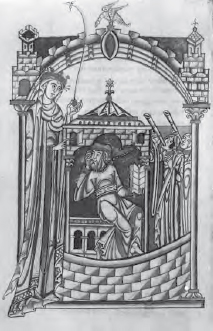Neoplatonism Through the RenaissanceNeoplatonism |
Who was Boëthius? |
Boëthius, Anicius Manlius Severinus (c. 480–c. 525) was the most famous Christian Neoplatonist in the West. He wrote extensively on the Trinity and produced many influential translations of commentaries on Aristotle, as well as works on education, science, and philosophy. His focus on logic later became a preoccupation with methods of thought among scholastic philosophers. In his commentary on Porphyry (233–309), Boëthius set up “the problem of universals,” based on conflicts between the ideas of Plato and Aristotle, which was to preoccupy scholastic thinkers between 1000 and 1150.

A twelfth-century illuminated manuscript depicts Philosophy visiting Boëthius. The Christian Neoplatonist wrote extensively on the Trinity and famously posed the “problem of universals” (Art Archive).
